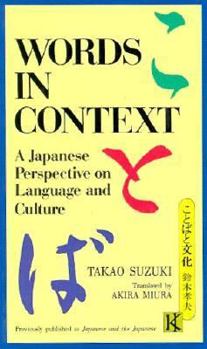Words in Context: A Japanese Perspective on Language and Culture
Select Format
Select Condition 
Book Overview
Observing the nuances of language, Shunji Suzuki contends, is more complicated than simply cataloging speech patterns. Language includes a set of unconscious expectations that communicate much, much... This description may be from another edition of this product.
Format:Paperback
Language:English
ISBN:0870116428
ISBN13:9780870116421
Release Date:January 1985
Publisher:Kodansha
Length:180 Pages
Weight:0.36 lbs.
Dimensions:0.5" x 4.4" x 7.2"
Related Subjects
Anthropology Asia Cultural Education & Reference Foreign Language Foreign Language Dictionaries & Thesauruses Foreign Language Fiction Foreign Language Learning Foreign Language Study Foreign Language Study & Reference Foreign Languages History Japan Japanese Politics & Social Sciences Social Science Social Sciences Study & Teaching Words, Language & GrammarCustomer Reviews
3 ratings
Get This Book (Whether or not you study Japan or Japanese)
Published by Thriftbooks.com User , 22 years ago
Wors In Context will give you an angle by which you may evaluate your deeply held cultural concepts, especially those that you may not consciously consider as cultural (and therefore, fluid) concepts.For example, the author considers the concept of mercy killing of animals. The average American mind would consider it a cruelty not to "alleviate misery" and through this lens, any alternate behavior becomes a violation of Natural Law. The Japanese concept as put forth in this book considers "mercy killing" a human-centered concept that, as such, is the antithesis of holding the animal's corporeality in high regard. Nature should decide the fate of an animal, instead. So, we have here two differing ideas of right-to-life concepts that people hold with the highest integrity. what to do?? Another example extends the differing concepts on animals by examining our relationships with pets. Whereas the American must have complete obedience of the animal to his every whim, the Japanese concept of a pet recognizes this treatment as a larger distortion of nature and gives more leeway for a dog to be a dog. (New York city in this light is an eye-opening case indeed as the New Yorker's near pet-worship is held in its highest dysfunctional relief when a man kneels to pick up after his dog, while the dog stares on and seemingly recongnizes and enjoys this debasing servitude. "Kind master, you missed a bit.")Despite that last poke, don't take the book as a polemic. It's not. It's just a solid exposition with ample reflection that, at a minimum, gets you far away from any of the common and misguided blanket statements on Japanese culture. However, in a wider view, the book gives many opportunities for you to evaluate your own culture.It is difficult to understand your own culture by holding it up to its own standards. Use this book to take a look inside yourself and learn something about Japan along the way.
Illuminating Book on the Power of Language
Published by Thriftbooks.com User , 24 years ago
This is a wonderful book. Suzuki teaches us how to see our own language and culture "from the outside" (from the perspective of a non-Indo-European mentality); because of this I have assigned Suzuki's book as a required text in several college courses on language and culture. I particularly recommend the sections on "translatability" (especially chapters 1 and 2) and the chapter on "Words for Self and Others" (chapter 6). The latter reports a splendid bit of linguistic research and analysis that any reader can understand and appreciate: in it Suzuki undertakes to explain how and why "I" and "You" relate to one another differently in Japanese- and English-speaking cultures.
Insightful exploration of the social context of language
Published by Thriftbooks.com User , 25 years ago
Although I am very much an casual student of Japanese, I was attracted by the contents of this publication as I flicked through it at the bookshop. It is a translation of an old (1973) work by Takao Suzuki, a Japanese linguistics academic. Surprisingly the book is written in a quite light style, with some humor even if a little dated. On the surface I found the book quite exciting because it helps explain how words which appear to have similar meanings from a 'dictionary' viewpoint, can have very different social meanings and cultural usage. Examples are the verbs "cut" and "wear", which appear relatively simple to English speakers, yet have a range of different verbs and very different contexts in their Japanese usage. The section on the cultural context of the words "lips", "nose" and "chin", for example, start to bring a feeling for the complexity of meaning, and perhaps the inadequacy of many dictionary definitions which up to now I had taken at face value.Moving through to the last chapter "Words for Self and Others" I found myself totally captivated by Suzuki's clear exposition of the misclassification of these parts of Japanese speech according to a misunderstanding of their relationship to English personal pronouns. It sounds heavy, but it is not, on the contrary it is a clear insight into the social context of words and language. I will never see those words in the same light again, and my Japanese will be certainly better for it.At a much more profound level Suzuki expounds his core belief that words create things, in contrast to our "natural" acceptance of the idea that objects exist independently of language. If this is too deep then fortunately it does not impose on the value of the book at the more pedestrian level at which I thoroughly enjoyed it. If you are a curious student of Japanese, then you will enjoy this book. I intend to read it again, and expect to enjoy it at least as much as the first time.




